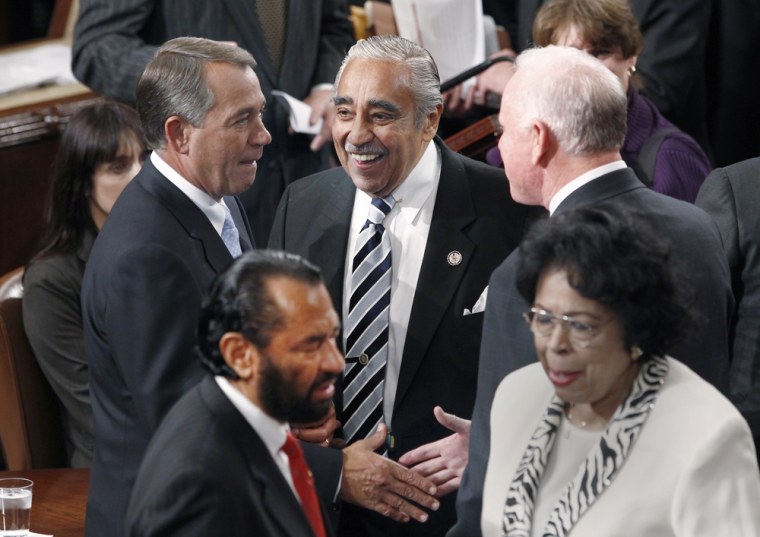With the ceremonial swearing in of the 112th Congress, Republicans have taken control of the House of Representatives, promising a fierce challenge to President Barack Obama and the potential for legislative gridlock in the countdown to the 2012 presidential election.
Rep. John Boehner, a long-serving Ohioan from a working-class background, was awarded the speaker's gavel Wednesday, ending the historic term of Democrat Nancy Pelosi, the San Francisco liberal who was the first woman to preside over the House. The speaker is second-in-line for the presidency after the vice president.
With the Senate still in Democratic hands — albeit with a smaller majority — House Republicans face bleak prospects for passing their ambitious legislative agenda, including a quick — no-debate — vote next week on repealing Obama's health care overhaul.
But they now can press legislation and conduct oversight hearings that will consume White House time and energy and further underline sharp divisions in a political system already consumed by angry partisanship.
Dealing with 'scar tissue'
Boehner acknowledged as much in a brief speech as he took the House gavel, declaring "a great deal of scar tissue has built up on both sides of the aisle."
Republicans retook the House majority riding a wave of discontent over Obama's handling of the economy and an uprising among voters sympathetic to newly emerged, ultraconservative Tea Party candidates. Republicans, including dozens of ultraconservative Tea Party-allied colleagues, now face the task of living up to loud promises to cut taxes and shrink the government.
"We gather here today at a time of great challenges," Boehner said in a brief speech on Wednesday. "Hard work and tough decisions will be required of the 112th Congress. No longer can we fall short. No longer can we kick the can down the road. The people voted to end business as usual, and today we begin carrying out their instructions."
While all eyes were on the House, Vice President Joe Biden swore in new members of the Senate, where Democrats' majority has slipped to 53 of 100 seats. Republicans picked up six seats in the November election.
Senators moved quickly to a debate over filibuster rules, with Democratic and Republican leaders accusing each other of obstructing progress and trying to muddle the parliamentary system. Existing Senate rules allow the opposition party to block action on legislation unless the majority can accumulate 60 votes in favor, an often impossible task in the closely divided chamber.
Focus on tackling debt, creating jobs
Senate Majority Leader Harry Reid, the long-serving Democrat who faced a serious challenge from a Tea Party candidate, signaled his party stood ready to fight in defense of Obama legislation already passed and to move forward with the president's agenda in the next two years.
"We have to do even more to help middle-class families, to create jobs, to hasten our energy independence, to improve our children's education and to fix our broken immigration system," he said.
Senate Republicans echoed the House theme. Minority Leader Sen. Mitch McConnell said the voters had made it clear they "want lawmakers to cut Washington, tackle the debt, rein in government and to help create the right conditions for private sector growth."
In the House, once members get down to business, Boehner may have a struggle keeping his caucus unified.
Many Republican freshmen will feel obliged to answer the call of hardcore conservative constituencies that sent them to Washington on contentious matters such as the need to raise the federal debt limit. The U.S. deficit is already bumping up against the old debt ceiling under heavy spending by Obama as he tried to pull the country out of the deepest economic slump since the 1930s Great Depression.
Republicans are determined to cut that spending and move the government out of the way of private enterprise with what they are calling their "cut and growth majority" in the House.
By way of example, House leaders set their first spending cut vote for Thursday, a 5 percent reduction in the amount spent for lawmakers' and committees' offices and leadership staff. Aides estimate the savings at $35 million over the next nine months.
Republicans have pledged to vote at least once a week on bills that cut spending. And the new House Majority Leader, Rep. Eric Cantor, challenged Obama to include significant spending cuts in his State of the Union address on Jan. 25.
But Republicans acknowledge they must do more than simply oppose Obama's every proposal, as they did the past two years of Democratic rule. That could mean distasteful compromise, anathema to Republican hard-liners, setting up the potential for conflicts in the party.
